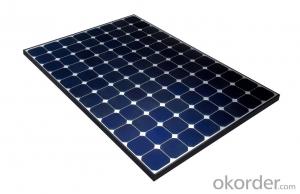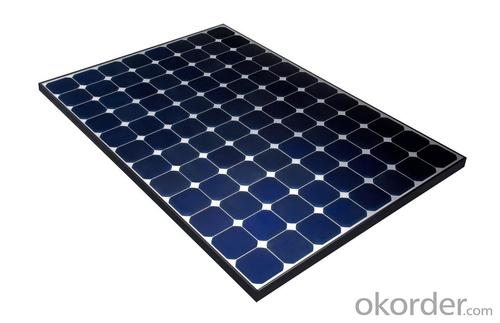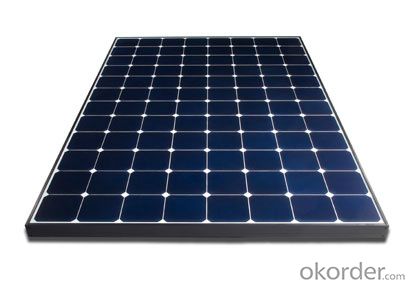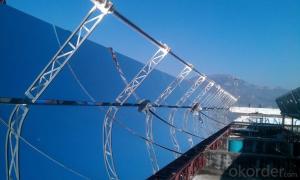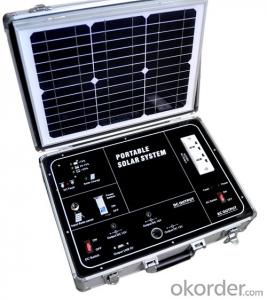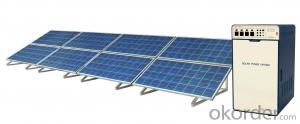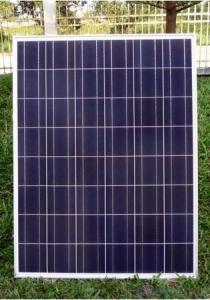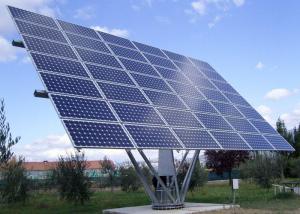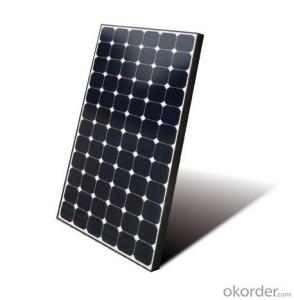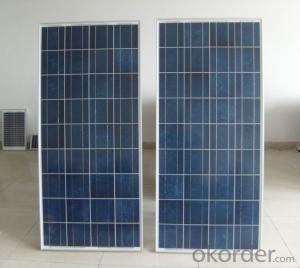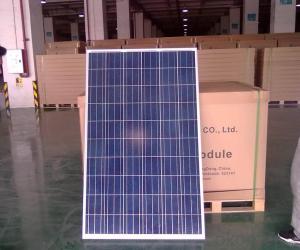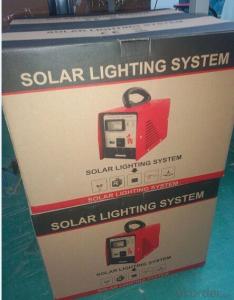80w Solar Energy Systems Blaine - Approved by TUV UL CE
- Loading Port:
- Shanghai
- Payment Terms:
- TT OR LC
- Min Order Qty:
- 1 pc
- Supply Capability:
- 100 pc/month
OKorder Service Pledge
OKorder Financial Service
You Might Also Like
Specification
80W Solar Home Solution Approved by TUV UL CE
Production description
PV array:
Convert sunlight instantly into DC electric power. Formed by the solar modules (also called photovoltaic
modules) in accordance with the system requirements for series and parallel.
Solar charge controller:
A charge controller may be used to power DC equipment with solar panels. The charge controller
provides a regulated DC output and stores excess energy in a battery as well as monitoring the battery
voltage to prevent over charge or over discharge. An inverter can be connected to the output of a charge
controller to drive AC loads.
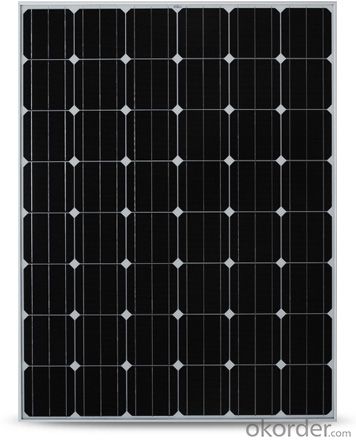
Feature
1.High conversion efficiencies resulting in superior power output performance.
2.Outstanding power output even in low light or high temperature conditions
3.Optimized design for ease of soldering and lamination
4.Long-term stability,reliability and performance
5.Low breakage rate
6.Color uniformaity
Physical characteristic
1. Rigorous quality control meets the highest international standards.
2. High-transmissivity low-iron tempered glass, strong aluminium frame.
3. Using UV-resistant silicon.
4. IS09001/14001/CE/TUV/UL
- Q: What is solar energy?
- Solar energy is a renewable form of energy that is derived from the sun's radiation. It is harnessed using solar panels or photovoltaic cells, which convert sunlight into electricity or heat. Solar energy is clean, abundant, and sustainable, making it an environmentally friendly alternative to fossil fuels.
- Q: What are the components of a solar energy system?
- A solar energy system is composed of several essential elements that collaborate to harness the sun's power and convert it into usable electricity. The primary constituents of a solar energy system are as follows: 1. Solar Panels: These are the most recognizable aspect of a solar energy system. Solar panels, also known as photovoltaic (PV) panels, comprise multiple solar cells that convert sunlight into direct current (DC) electricity. They are typically installed on the roof or ground to capture sunlight. 2. Inverter: The DC electricity generated by the solar panels must be converted into alternating current (AC) electricity, which is the type of electricity used in homes and businesses. An inverter is responsible for this conversion process, ensuring that the electricity can be utilized by various appliances and devices. 3. Mounting System: To securely position solar panels on rooftops or the ground, a mounting system is employed. This system consists of racking or frames that hold the panels in place and allow for optimal sunlight exposure. Additionally, the mounting system ensures that the panels are installed at the correct angle and orientation to maximize energy production. 4. Electrical Wiring: Proper electrical wiring is crucial for connecting the solar panels, inverter, and other components of the solar energy system. The wiring carries the electricity from the panels to the inverter and then to the building's electrical panel, where it can be distributed and used. 5. Batteries (Optional): In certain solar energy systems, batteries are included to store surplus electricity generated during the day for use during the night or periods of low sunlight. These batteries store the excess energy and release it when needed, enabling a more consistent and reliable power supply. 6. Monitoring System: Many solar energy systems are equipped with a monitoring system that enables users to track the performance and energy production of their system. Real-time data on energy generation, consumption, and savings can be accessed through a web-based platform or a smartphone app. 7. Grid Connection (Optional): Solar energy systems can be connected to the electrical grid, enabling excess electricity to be fed back into the grid when the system produces more energy than is being used. This process, known as net metering, allows homeowners to earn credits or receive compensation for the excess energy they generate. In conclusion, a solar energy system is a sophisticated and interconnected collection of components that collaborate to harness the sun's energy and convert it into usable electricity for various applications. These components enable individuals and businesses to reduce their reliance on traditional fossil fuel-based energy sources and contribute to a cleaner and more sustainable future.
- Q: Can a solar energy system be installed on a sports arena or stadium?
- Yes, a solar energy system can be installed on a sports arena or stadium. In fact, many stadiums around the world have already implemented solar panels to generate clean and renewable energy. These systems can be installed on rooftops, parking lots, or even integrated into the design of the stadium itself. Not only does this help reduce the carbon footprint of the facility, but it also helps offset energy costs and promotes sustainability in the sports industry.
- Q: Do solar energy systems require a backup power source during outages?
- During power outages, solar energy systems usually do not need a backup power source. This is because solar panels are specifically designed to directly convert sunlight into electricity. As long as there is sunlight available, the solar panels will keep generating electricity, even when there is no power from the grid. However, it is important to mention that solar energy systems are typically connected to the electrical grid. Therefore, when there is a power outage and the grid goes down, the solar energy system will also be unable to supply electricity to the home or building. This is done to ensure the safety of utility workers who might be working on restoring power. To overcome this limitation and have electricity during outages, homeowners or businesses with solar energy systems have the option of using battery storage solutions. These batteries store any excess electricity generated by the solar panels, which can then be utilized as a backup power source when the grid is down. By incorporating a battery storage system, the solar energy system can continue to power essential appliances or even the entire home or building during outages, thereby maximizing the advantages of solar energy.
- Q: Are there any risks of electrical arcing with solar energy systems?
- Yes, there are risks of electrical arcing with solar energy systems. Electrical arcing can occur due to various factors such as faulty wiring, loose connections, or damaged components. This can lead to fires, damage to the system, and potential harm to individuals nearby. Therefore, proper installation, regular maintenance, and adherence to safety guidelines are crucial to minimize the risks of electrical arcing in solar energy systems.
- Q: Can solar energy systems be used for emergency power backup?
- Yes, solar energy systems can be used for emergency power backup. Solar panels can generate electricity during the day, even when the grid is down, and this energy can be stored in batteries to provide power during emergencies or blackouts. This allows for a reliable and sustainable source of backup power, reducing reliance on traditional generators and fossil fuels.
- Q: Can solar energy systems be used in all locations?
- Solar energy systems can be used in most locations, but their efficiency and effectiveness may vary depending on factors such as sunlight availability, climate, and geographical location.
- Q: Can solar energy systems be used in areas with limited access to educational resources?
- Yes, solar energy systems can be used in areas with limited access to educational resources. Solar energy systems are relatively simple to install and maintain, requiring minimal technical knowledge. Additionally, there are various resources available online and through organizations that provide step-by-step guides and training materials on solar energy systems. This enables individuals in areas with limited access to educational resources to learn and implement solar energy systems, ultimately enabling them to harness clean and sustainable energy.
- Q: Can a solar energy system be installed on a green roof?
- Yes, a solar energy system can be installed on a green roof. In fact, combining solar panels with a green roof can have several benefits. A green roof provides insulation, reduces stormwater runoff, and helps mitigate the urban heat island effect. By installing solar panels on a green roof, the panels can benefit from the cooling effect of the vegetation, resulting in improved energy production and efficiency. Additionally, the green roof can provide shade to the solar panels, reducing the risk of overheating and extending their lifespan. It is important to ensure that the structural integrity of the roof can support both the weight of the green roof and the solar panels, and proper installation and maintenance are crucial to ensure the success and longevity of the system.
- Q: Can a solar energy system be installed on a sloped roof?
- Yes, a solar energy system can be installed on a sloped roof. In fact, sloped roofs are quite common for solar panel installations. The angle and orientation of the roof can actually have a positive impact on the system's efficiency. By tilting the solar panels at an optimal angle, it allows for better sunlight absorption and maximizes the energy generation. Additionally, the slope of the roof can help with self-cleaning as rainwater can easily wash away any dirt or debris that may accumulate on the panels. However, it is important to consider the structural integrity of the roof and ensure that it can support the weight of the solar panels.
Send your message to us
80w Solar Energy Systems Blaine - Approved by TUV UL CE
- Loading Port:
- Shanghai
- Payment Terms:
- TT OR LC
- Min Order Qty:
- 1 pc
- Supply Capability:
- 100 pc/month
OKorder Service Pledge
OKorder Financial Service
Similar products
Hot products
Hot Searches
Related keywords
